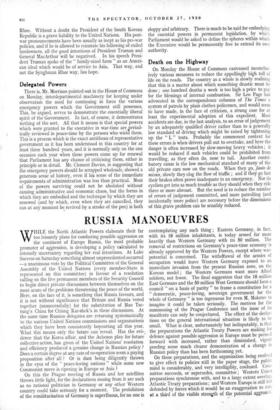Delegated Powers
There is, Mr. Morrison pointed out in the House of Commons on Monday, interdepartmental machinery for keeping under observation the need for continuing in force the various emergency powers which the Government still possesses. This, he argued, serves to demonstrate the essentially liberal spirit of the Government. In fact, of course, it demonstrates nothing of the sort. All that it means is that special powers which were granted to the executive in war-time are _period- . ically reviewed in peace-time by the persons who wield them. This is a process which is the exact antithesis of representative government as it has been understood in this country for at least three hundred years, and it is normally only on the one occasion each year when these powers come up for renewal that Parliament has any chance of criticising them, either in principle or in detail. Mr. Clement Davies, in suggesting that the emergency powers should be scrapped wholesale, showed a generous sense of history, even if his sense of the immediate requirements of administration was less than practical. " Most of the powers surviving could not be abolished without causing administrative and economic chaos, but the forms in which they are embodied and the technique by which they are renewed (and by which, even when they are cancelled, they can at any moment be revived by a stroke of the pen) is both sloppy and arbitrary. There is much to be said for embodying the essential powers in permanent legislation, by which Parliament would be asked to define the spheres within which the Executive would be permanently free to extend its own authority.


















 Previous page
Previous page